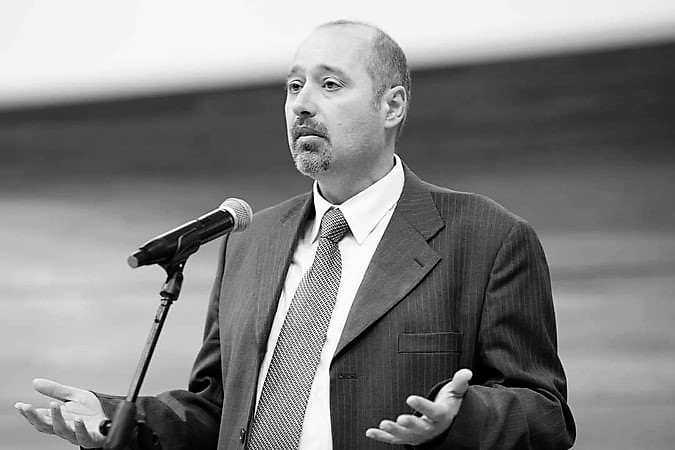
A good, so very good, humble, dedicated and tireless peace activist is no longer with us.
“What happens when a peace activist dies? Whether a little bit of peace goes with them, or whether people take responsibility for that bit as well – that is up to us,” wrote Amra Pandžo, director of Little Steps and long-time peace activist, in the wake of activist and humanitarian Goran Bubalo’s passing.
Bubalo, director of the Network for Building Peace, passed away on June 9th 2020 in Sarajevo at the age of 49, following a short and difficult illness.
The death of the celebrated peace activist – a man who influenced the Bosnian and international peace path, as well as the struggle for human rights – provoked a tide of reactions from friends, colleagues, young people, and all those who knew him, directly or indirectly.
“The horrific and surreal news of the death left us all numb today. A good, so very good, humble, dedicated and tireless peace activist is no longer with us. He was a real fighter for people and for peace. But memories do remain, warm and indelibly fixed in our minds,” writes Slobodan Šoja, commenting on the Network for Building Peace’s Facebook post regarding Bubalo’s passing.
Bubalo was born in 1972 in Čapljina and spent most of his life in Sarajevo. He was president of the Network for Building Peace and a lifelong volunteer in the fight for human rights and freedoms. His struggle for peace and humanity was directed towards solving the issues of all generations.
He never limited his peace journey to national borders. In fact, quite the contrary, he was a true cosmopolitan in his acceptance of all people, no matter what, never standing for any kind of discrimination.
“Unfortunately, politicians are the ones who mostly put emphasis on differences among people via the repeated use of hate speech to separate us, pointing to the most common fictional differences targeting the other religious groups and nations, migrants and refugees, claims of our nation’s supremacy over theirs, sowing poison against everyone they believe is different,” said Bubalo in an interview with Al Jazeera last year.
Bubalo saw and treated people as entirely equal. Never in his work, actions or private life did he look through the prism of nationality. Everything he did was aimed at people of all faiths, nations, races and generations.
He saw his comrades and colleagues as his siblings, and in doing so he built his “peace family”. Connecting to people in a formal and informal way, he was always prepared to meet any and everyone who asked him for help, without discrimination or judgement.
“He wanted to help. He liked being the first NGO door to knock on in Bosnia. I don’t know who else would endure that and take on that kind of responsibility. His commitment to that mission will not be forgotten,” said Amra Pandžo.
His giving hand and his rejection of any kind of competitiveness towards others is not something that went unnoticed within the NGO sector, as well as among his associates. His selfless dissemination of information demonstrated his dedication to not only his own success, but everyone’s.
“Goran would send us an e-mail every day with information about donors, news, NGOs, colleagues. Most often, these emails would arrive at six in the morning, sometimes at two after midnight. So often I wondered ‘What on earth is this man doing?’” recalls Amra Pandžo.
Bubalo never liked to be the center of media attention. He knew that real help was not to be found on that side of the story. In order to convince people of the positive side of Bosnia and the broader narrative surrounding it, he was rigorous about every piece of advice and every suggestion he made to all those who asked for it, as well as to those who did not.
Maja Gasal, director of the Academy for Women, remembers how optimistic he was: “First of all, you always saw the optimistic side to everything, and I don’t really know if there was anything pessimistic in you. I don’t remember meeting a person ever in my life who responds to messages at all times, who helps, binds, advises, in addition to doing his job flawlessly and doing his best to make this society better.”
His dedication to the peace mission was unrivalled, so much so that it was recognized by the International Peace Center, which – inspired by the work of Bubalo – awarded the Network for Building Peace the Freedom Award for its contribution to humanitarianism and human rights.
There are those among his friends who say they have no idea when exactly they met him because he was so much a natural part of their lives. Even those who did not know him personally share this opinion. One of them is Samir Mušović, who, in comments on the Network’s Facebook post, said that Bubalo was so kind in communication with him that he felt like he had known him for years. Mušović added that he could not understand how someone could be so good when they did not know you personally.
His unrelenting loyalty and his availability at any time of the day or night speak to his true nature: he was one of those rare unconditional and tireless friends, and to a large number of people. Bubalo was a support mechanism for many and the first person they would call in difficult life moments.
Young people were an important part of his mission and life. A calmness in his words and smile awakened the younger generation’s hope for a better tomorrow. He approached every activity dedicated to young people with empathy and without discrimination. This commitment is also reflected in the constant sharing of information about seminars, projects and other opportunities offered to young people.
Samir Beharić, writing for Buka Magazine, notes how Network for Building Peace’s newsletter was always an inexhaustible source of information: “For a good morning and a successful day, Goran Bubalo has been serving us priceless tips on a virtual tray for years. On everything from how to get a scholarship, embark on a youth exchange, expand our horizons – in other words, how to become a better version of ourselves.” Beharić adds that Bubalo knew exactly how to filter the information and enrich it with valuable advice and recommendations.
His service was and will remain endemic in youth work, and people should, as Ismail Šehić, director of the Bosnian Representative Association for Valuable Opportunities – BRAVO, told Sarajevska Sehara, erect a monument to Bubalo in order to honor him for everything he did.
Regardless of the situation, Bubalo gave his utmost at every moment of his life in the service of the values he promoted and lived by. He was an undisputed humanitarian, a defender of human rights, and a man with a big heart, and his last wish to donate all of his money to humanitarian causes illustrates how he remained true to himself until his final breath.
It is hard to find adequate words of praise and gratitude for all that this Peace Hero did throughout his life’s journey. In memory of other peace activists, Bubalo would write letters every time one of them passed away. Whether this peace activist and humanitarian will be forgotten or whether the memory of him will become part of Bosnia and Herzegovina’s culture of remembrance is a moral question to which all of Bosnian society will be answerable.
Every person would like, at least once in their lifetime, for their deeds to speak for them in the same way that Goran’s speak volumes on his behalf.






